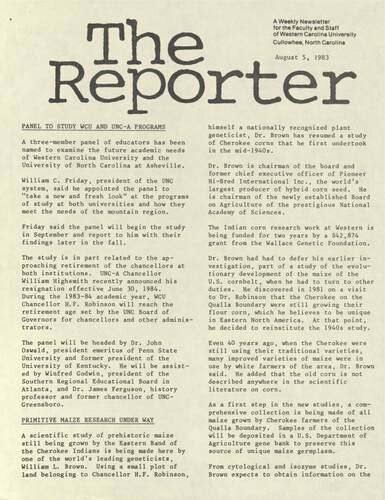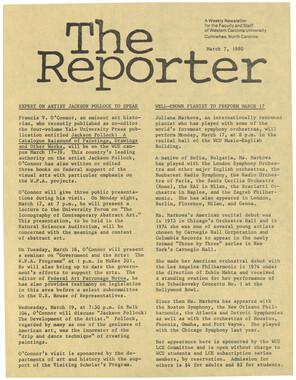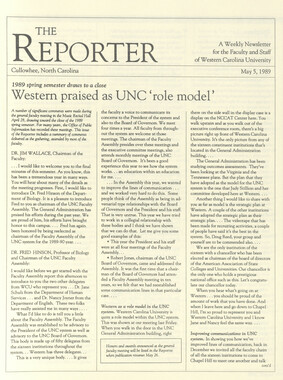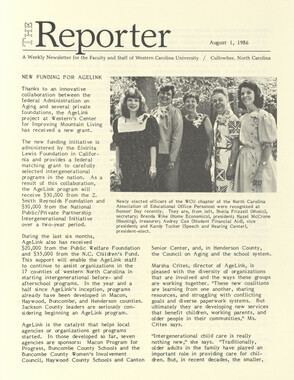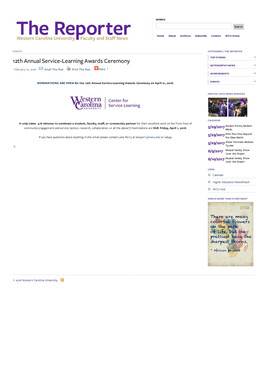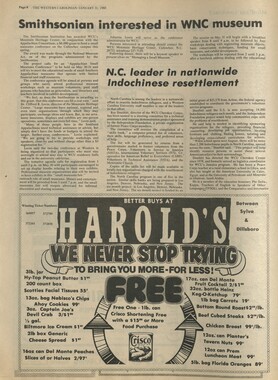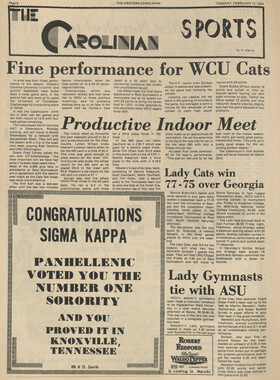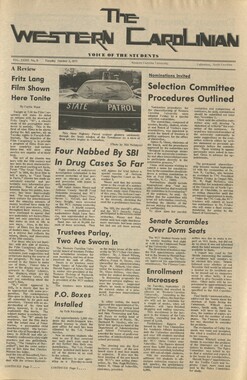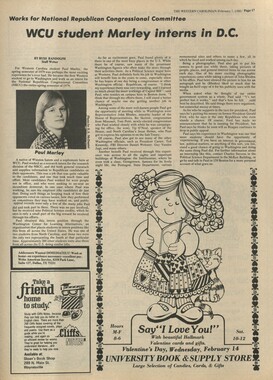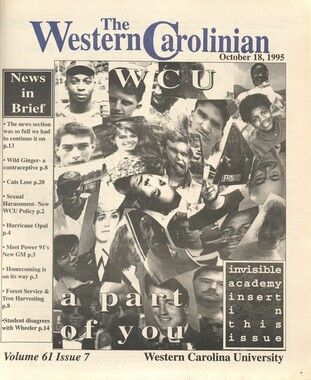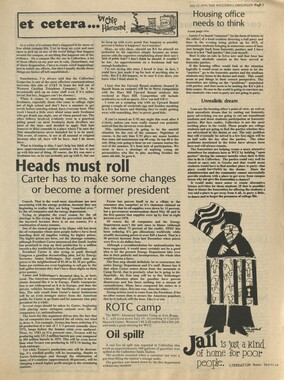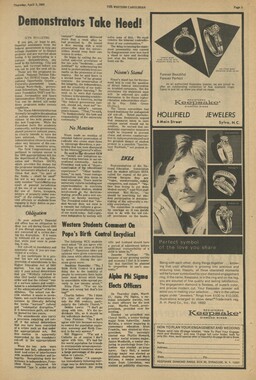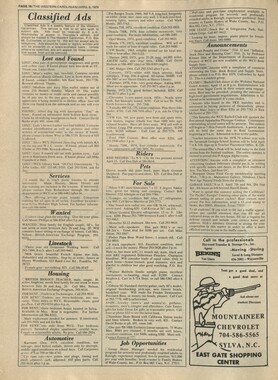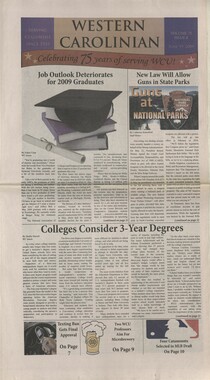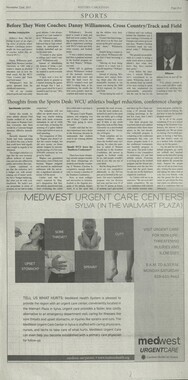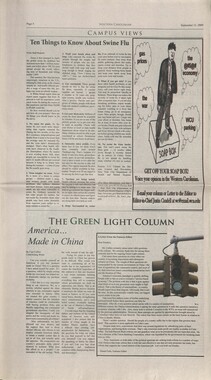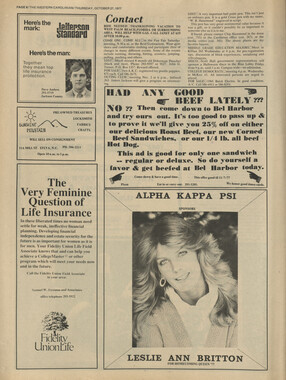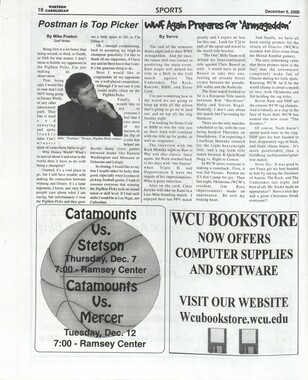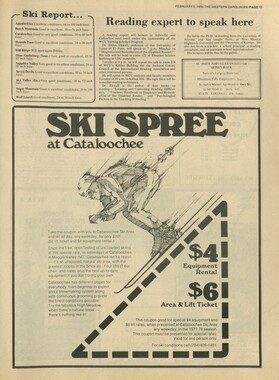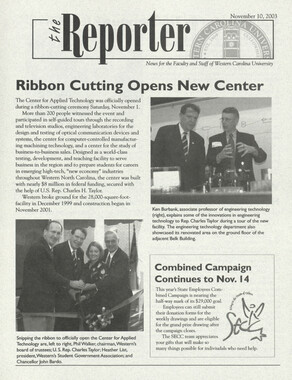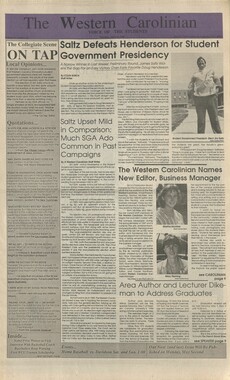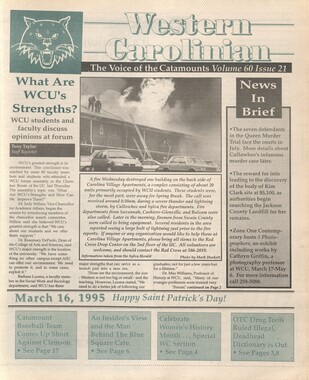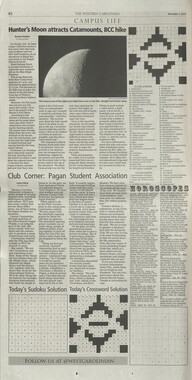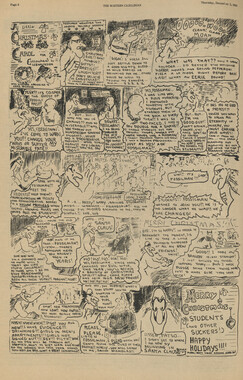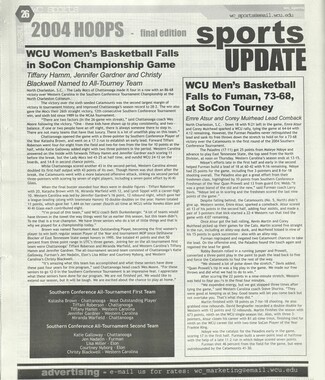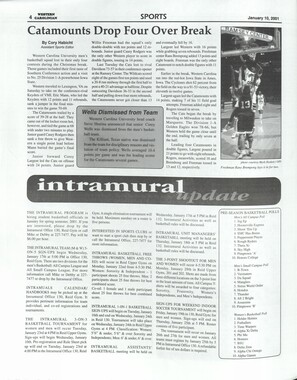Western Carolina University (21)
View all
- Canton Champion Fibre Company (2308)
- Cherokee Traditions (291)
- Civil War in Southern Appalachia (165)
- Craft Revival (1942)
- George Masa Collection (135)
- Great Smoky Mountains - A Park for America (2901)
- Highlights from Western Carolina University (422)
- Horace Kephart (941)
- Journeys Through Jackson (159)
- LGBTQIA+ Archive of Jackson County (85)
- Oral Histories of Western North Carolina (314)
- Picturing Appalachia (6798)
- Stories of Mountain Folk (413)
- Travel Western North Carolina (153)
- Western Carolina University Fine Art Museum Vitreograph Collection (129)
- Western Carolina University Herbarium (92)
- Western Carolina University: Making Memories (738)
- Western Carolina University Publications (2491)
- Western Carolina University Restricted Electronic Theses and Dissertations (146)
- Western North Carolina Regional Maps (71)
- World War II in Southern Appalachia (131)
University of North Carolina Asheville (6)
View all
- Allanstand Cottage Industries (62)
- Appalachian National Park Association (53)
- Bennett, Kelly, 1890-1974 (1463)
- Berry, Walter (76)
- Brasstown Carvers (40)
- Carver, George Washington, 1864?-1943 (26)
- Cathey, Joseph, 1803-1874 (1)
- Champion Fibre Company (233)
- Champion Paper and Fibre Company (297)
- Cherokee Indian Fair Association (16)
- Cherokee Language Program (22)
- Crowe, Amanda (40)
- Edmonston, Thomas Benton, 1842-1907 (7)
- Ensley, A. L. (Abraham Lincoln), 1865-1948 (275)
- Fromer, Irving Rhodes, 1913-1994 (70)
- George Butz (BFS 1907) (46)
- Goodrich, Frances Louisa (120)
- Grant, George Alexander, 1891-1964 (96)
- Heard, Marian Gladys (60)
- Kephart, Calvin, 1883-1969 (15)
- Kephart, Horace, 1862-1931 (313)
- Kephart, Laura, 1862-1954 (39)
- Laney, Gideon Thomas, 1889-1976 (439)
- Masa, George, 1881-1933 (61)
- McElhinney, William Julian, 1896-1953 (44)
- Niggli, Josephina, 1910-1983 (10)
- North Carolina Park Commission (105)
- Osborne, Kezia Stradley (9)
- Owens, Samuel Robert, 1918-1995 (11)
- Penland Weavers and Potters (36)
- Roberts, Vivienne (15)
- Roth, Albert, 1890-1974 (142)
- Schenck, Carl Alwin, 1868-1955 (1)
- Sherrill's Photography Studio (2565)
- Southern Highland Handicraft Guild (127)
- Southern Highlanders, Inc. (71)
- Stalcup, Jesse Bryson (46)
- Stearns, I. K. (213)
- Thompson, James Edward, 1880-1976 (226)
- United States. Indian Arts and Crafts Board (130)
- USFS (683)
- Vance, Zebulon Baird, 1830-1894 (1)
- Weaver, Zebulon, 1872-1948 (58)
- Western Carolina College (230)
- Western Carolina Teachers College (282)
- Western Carolina University (2008)
- Western Carolina University. Mountain Heritage Center (18)
- Whitman, Walt, 1819-1892 (10)
- Wilburn, Hiram Coleman, 1880-1967 (73)
- Williams, Isadora (3)
- Cain, Doreyl Ammons (0)
- Crittenden, Lorraine (0)
- Rhodes, Judy (0)
- Smith, Edward Clark (0)
- Appalachian Region, Southern (2924)
- Asheville (N.C.) (1941)
- Avery County (N.C.) (26)
- Blount County (Tenn.) (195)
- Buncombe County (N.C.) (1672)
- Cherokee County (N.C.) (283)
- Clay County (N.C.) (556)
- Graham County (N.C.) (236)
- Great Smoky Mountains National Park (N.C. and Tenn.) (525)
- Haywood County (N.C.) (3569)
- Henderson County (N.C.) (70)
- Jackson County (N.C.) (4913)
- Knox County (Tenn.) (35)
- Knoxville (Tenn.) (13)
- Lake Santeetlah (N.C.) (10)
- Macon County (N.C.) (420)
- Madison County (N.C.) (215)
- McDowell County (N.C.) (39)
- Mitchell County (N.C.) (135)
- Polk County (N.C.) (35)
- Qualla Boundary (982)
- Rutherford County (N.C.) (76)
- Swain County (N.C.) (2182)
- Transylvania County (N.C.) (270)
- Watauga County (N.C.) (12)
- Waynesville (N.C.) (86)
- Yancey County (N.C.) (72)
- Aerial Photographs (3)
- Aerial Views (60)
- Albums (books) (4)
- Articles (1)
- Artifacts (object Genre) (228)
- Bibliographies (1)
- Biography (general Genre) (2)
- Cards (information Artifacts) (38)
- Clippings (information Artifacts) (191)
- Copybooks (instructional Materials) (3)
- Crafts (art Genres) (622)
- Depictions (visual Works) (21)
- Design Drawings (1)
- Drawings (visual Works) (185)
- Envelopes (73)
- Exhibitions (events) (1)
- Facsimiles (reproductions) (1)
- Fiction (general Genre) (4)
- Financial Records (12)
- Fliers (printed Matter) (67)
- Glass Plate Negatives (381)
- Guidebooks (2)
- Internegatives (10)
- Interviews (815)
- Land Surveys (102)
- Letters (correspondence) (1013)
- Manuscripts (documents) (618)
- Maps (documents) (177)
- Memorandums (25)
- Minutes (administrative Records) (59)
- Negatives (photographs) (6090)
- Newsletters (1290)
- Newspapers (2)
- Notebooks (8)
- Occupation Currency (1)
- Paintings (visual Works) (1)
- Pen And Ink Drawings (1)
- Periodicals (193)
- Personal Narratives (10)
- Photographs (12976)
- Plans (maps) (1)
- Poetry (5)
- Portraits (4568)
- Postcards (329)
- Programs (documents) (181)
- Publications (documents) (2443)
- Questionnaires (65)
- Relief Prints (26)
- Sayings (literary Genre) (1)
- Scrapbooks (282)
- Sheet Music (2)
- Slides (photographs) (402)
- Songs (musical Compositions) (2)
- Sound Recordings (796)
- Specimens (92)
- Speeches (documents) (18)
- Tintypes (photographs) (8)
- Transcripts (322)
- Video Recordings (physical Artifacts) (23)
- Text Messages (0)
- A.L. Ensley Collection (275)
- Appalachian Industrial School Records (7)
- Appalachian National Park Association Records (336)
- Axley-Meroney Collection (2)
- Bayard Wootten Photograph Collection (20)
- Bethel Rural Community Organization Collection (7)
- Blumer Collection (5)
- C.W. Slagle Collection (20)
- Canton Area Historical Museum (2110)
- Carlos C. Campbell Collection (462)
- Cataloochee History Project (64)
- Cherokee Studies Collection (4)
- Daisy Dame Photograph Album (5)
- Daniel Boone VI Collection (1)
- Doris Ulmann Photograph Collection (112)
- Elizabeth H. Lasley Collection (1)
- Elizabeth Woolworth Szold Fleharty Collection (4)
- Frank Fry Collection (95)
- George Masa Collection (173)
- Gideon Laney Collection (452)
- Hazel Scarborough Collection (2)
- Hiram C. Wilburn Papers (28)
- Historic Photographs Collection (236)
- Horace Kephart Collection (861)
- Humbard Collection (33)
- Hunter and Weaver Families Collection (1)
- I. D. Blumenthal Collection (4)
- Isadora Williams Collection (4)
- Jesse Bryson Stalcup Collection (47)
- Jim Thompson Collection (224)
- John B. Battle Collection (7)
- John C. Campbell Folk School Records (80)
- John Parris Collection (6)
- Judaculla Rock project (2)
- Kelly Bennett Collection (1482)
- Love Family Papers (11)
- Major Wiley Parris Civil War Letters (3)
- Map Collection (12)
- McFee-Misemer Civil War Letters (34)
- Mountain Heritage Center Collection (4)
- Norburn - Robertson - Thomson Families Collection (44)
- Pauline Hood Collection (7)
- Pre-Guild Collection (2)
- Qualla Arts and Crafts Mutual Collection (12)
- R.A. Romanes Collection (681)
- Rosser H. Taylor Collection (1)
- Samuel Robert Owens Collection (94)
- Sara Madison Collection (144)
- Sherrill Studio Photo Collection (2558)
- Smoky Mountains Hiking Club Collection (616)
- Stories of Mountain Folk - Radio Programs (374)
- The Reporter, Western Carolina University (510)
- Venoy and Elizabeth Reed Collection (16)
- WCU Gender and Sexuality Oral History Project (32)
- WCU Mountain Heritage Center Oral Histories (25)
- WCU Oral History Collection - Mountain People, Mountain Lives (71)
- WCU Students Newspapers Collection (1923)
- Western North Carolina Tomorrow Black Oral History Project (69)
- William Williams Stringfield Collection (2)
- Zebulon Weaver Collection (109)
- African Americans (390)
- Appalachian Trail (35)
- Artisans (521)
- Cherokee art (84)
- Cherokee artists -- North Carolina (10)
- Cherokee language (21)
- Cherokee pottery (101)
- Cherokee women (208)
- Church buildings (190)
- Civilian Conservation Corps (U.S.) (111)
- College student newspapers and periodicals (2012)
- Dams (107)
- Dance (1023)
- Education (222)
- Floods (61)
- Folk music (1015)
- Forced removal, 1813-1903 (2)
- Forest conservation (220)
- Forests and forestry (1196)
- Gender nonconformity (4)
- Great Smoky Mountains National Park (N.C. and Tenn.) (181)
- Hunting (45)
- Landscape photography (25)
- Logging (119)
- Maps (83)
- Mines and mineral resources (8)
- North Carolina -- Maps (18)
- Paper industry (38)
- Postcards (255)
- Pottery (135)
- Railroad trains (72)
- Rural electrification -- North Carolina, Western (3)
- School integration -- Southern States (2)
- Segregation -- North Carolina, Western (5)
- Slavery (5)
- Sports (452)
- Storytelling (243)
- Waterfalls -- Great Smoky Mountains (N.C. and Tenn.) (66)
- Weaving -- Appalachian Region, Southern (280)
- Wood-carving -- Appalachian Region, Southern (328)
- World War, 1939-1945 (173)
The Reporter, August 1983
-
The Reporter is a publication produced by Western Carolina University featuring news, events, and campus community updates for faculty and staff. The publication began in August of 1970 and continues digitally today. Click on the link in the “Related Mate
-
-
The A Weekly Newsletter for the Faculty and Staff of Western Carolina University Cullowhee, North Carolina August 5, 1983 PANEL TO STUDY WCU AND UNC-A PROGRAMS A three-member panel of educators has been named to examine the future academic needs of Western Carolina University and the University of North Carolina at Asheville. William C. Friday, president of the UNC system, said he appointed the pan el to "take a new and fresh look" at the programs of study at both universities and how they meet the needs of the mountain region. Friday said the panel will begin the study in September and report to him with their findings later in the fall. The study is in part related to the approaching retirement of the chancellors at both institutions. UNC-A Chancellor William Highsmith recently announced his resignation effective June 30, 1984. During the 1983-84 academic year, WCU Chancellor H.F. Robinson will reach the retirement age set by the UNC Board of Governors for chancellors and other administrators. The panel will be headed by Dr. John Oswald, president emeritus of Penn State University and former president of the University of Kentucky. He will be assisted by Winfred Godwin, president of the Southern Regional Educational Board in Atlanta, and Dr. James Ferguson, history professor and former chancellor of UNC-Greensboro. PRIMITIVE MAIZE RESEARCH UNDER WAY A scientific study of prehistoric maize still being grown by the Eastern Band of the Cherokee Indians is being made here by one of the world's leading geneticists, William L. Brown. Using a small plot of land belonging to Chancellor H.F. Robinson, himself a nationally recognized plant geneticist, Dr. Brown has resumed a study of Cherokee corns that he first undertook in the mid-1940s. Dr. Brown is chairman of the board and former chief executive officer of Pioneer Hi-Bred International Inc., the world's largest producer of hybrid corn seed. He is chairman of the newly established Board on Agriculture of the prestigious National Academy of Sciences. The Indian corn research work at Western is being funded for two years by a $42,874 grant from the Wallace Genetic Foundation. Dr. Brown had had to defer his earlier investigation, part of a study of the evolutionary development of the maize of the U.S. cornbelt, when he had to tu rn to other duties. He discovered in 1981 on a visit to Dr. Robinson that the C herokee on the Qualla Boundary were still growing their flour corn, which he believes to be unique in Eastern North America. At that point, he decided to reinstitute the 1940s study. Even 40 years ago, when the Cherokee were still using their traditional varieties, many improved varieties of maize were in use by white farmers of the area, Dr. Brown said. He added that the old corn is not described anywhere in the s cientific literature on corn. As a first step in the new studies, a comprehensive collection is being made of all maize grown by Cherokee farmers of the Qualla Boundary. Samples of the collection will be deposited in a U.S. Department of Agriculture gene bank to preserve this source of unique maize germplasm. From cytological and isozyme studies, Dr. Brown expects to obtain information on the possible origin of Cherokee maize and its relationship to ancestral types. For example, he said, "it is suspected but not yet proved that the Cherokee flour corn may be derived from a race of maize still existing in central Mexico. If this relationship proves to be true, it raises a number of interesting questions as to how the Mexican race of corn moved to the s outheastern United States without leaving traces of its migration and why its use in southeastern North America was limited to the Cherokee." Dr. Brown said a better understanding of Eastern Cherokee maize should add to scientific knowledge of the evolution of the species. "It could reveal why the use of certain varieties has apparently been limited to the Ch erokee and why those varieties did not become a part of colonial agriculture." While he makes no claim as to the possible value of Cherokee maize as breeding material, Dr. Brown said, "there is the possibility that unique, useful genes may be found in such varieties." In any event, he said, "a better understanding of the evolution of maize is always likely to contribute to more enlightened breeding schemes." FACULTY PUBLICATION C.R. Lovin. "Planning for Permanence: Is That What We Really Want?" in Federation Reports: The Journal of the State Humanities Councils, 6 (May/June 1983), 19-20. NAMES IN THE NEWS NORMA B. COOK (Medical Technology) attended the annual meetings of the American Society for Medical Technology in Los Angeles June 17-22. While there, she was appointed to a national board to review regulations for clinical laboratories as imposed by the Food and Drug Administration. She also continues to serve on the editorial review board for articles pertaining to antimicrobial susceptibility testing. NANCY JOYNER, JIM NICHOLL, and BILL PAULK (all English) attended the Second Annual Conference of the Appalachian Writers Association at East Tennessee State University in Johnson City July 21-23. Paulk presided over a poetry reading session and Dr. Nicholl presented a paper titled "Writing Electronically: 1983 and Beyond." Dr. Nicholl also was elected to the a ssociation's advisory board. JOEL MILNER (Psychology) gave two invited presentations in Washington, D.C., in the month of June. On June 23, he gave an address, "Prediction and Explanation of Child Abuse," at the National Institute of Mental Health, Division of Criminal and Juvenile Justice. The following day, he presented "Current Status of the Child Abuse Potential Inventory" at the National Center for Child Abuse and Neglect. JAMES E. DOOLEY (vice chancellor, Development and Special Services) recently served as a judge of the performing arts competition at the 16th annual South Carolina Festival of Flowers in Greenwood. EDUCATIONAL OFFICE PERSON OF THE MONTH (Ed. note: Western's NCAEOP chapter will spotlight one of its active members each month this year. The selection is random, because the group feels quiet contributions can be as important as the ones that get noticed, but this month's choice happens to be an unusually active member.) Carolyn Bryson Wiggins is the Educational Office Person for the month of August. She is a secretary in the dean's office of the School of Arts and Sciences, where she has worked full-time since 1977 and as a student worker before that. A native of Sylva, Carolyn graduated from Western in 1977. Her husband, Eugene, is a security guard at Western. Carolyn is active in the district and local NCAEOP organizations as well as the Cane Creek Extension Homemakers Club, which she served two years as president. She enjoys the crafts she learns and likes to keep busy. She has attended the district and state conventions of NCAEOP and NCSEA, and a number of workshops and seminars aimed at professional development. Recently she was cited as campus "EOP of the Year." She is currently secretary of WCU's NCAEOP and Arts and Sciences co-captain for Cullowhee Campus Capers, scheduled for August 17. Th<=> for tha Faculty and Staff of Woatom Carolina Ontvaralty Cullowhaa, North Carolina August 19, 1983 ROBINSON OFFERS OPTIMISM TO GRADUATES Today's college graduates are being given an "excessive burden of pessimistic and negative attitudes from society" and a "world beset with heavy problems," WCU Chancellor H.F. Robinson told summer graduates August 5, "but there are increasing reasons to be optimistic." Dr. Robinson, who traditionally delivers the summer commencement address at Western, said he believes there will be a resolution to the nuclear arms race, that population and pollution problems can be controlled, that the economy will improve and that the discipline of education will return to its high status in society. "The arms race is one totally controlled by political powers, and those same politicians are subject to the will of the people at the ballot box, which is the gr eatest power of all," Dr. Robinson told the large gathering in Reid Gym. "Good judgement and common sense will prevail among the political heads of the leading nations of this world. I believe that the people here, and in those countries where the greatest threat is posed in the armament race, will take the necessary steps to ensure peace." "We can curb environmental pollution factors and we will do so when it is the will and the desire of man to change his ways and be concerned not only for today, but for tomorrow and the generations that will follow us," he said. The problems of feeding and accommodating the people of the planet are fantastic, Dr. Robinson said, but population has leveled and humanity can find ways to "improve life above that of today." He added, "It requires our working in harmony with those in Third World countries, accommodating their needs, and our making certain sacrifices to enable us all to live in one world." Focusing on education, Dr. Robinson said the report of the National Commission on Excellence in Education is a development that will wake us up to prjblems and their possible solutions. Society will profit, he said. "I believe priority will be placed on improvements in schools and teachers. We will return to providing a homelife for the child that is conducive to learning, whether at school, in the church, or in the home." "A bright future awaits those who are willing to work hard, to be persistent, to utilize their total talents and to strive to excel in every activity," he said. Quoting broadcast journalist Jessica Savitch, he said, "In modern society there is very little done these days in pursuit of excellence, but whatever there is s tands out for its rarity." IRISH-APPALACHIAN FESTIVAL OPENS SHOW Some of the world's best Irish fiddlers and flutists, ballad singers and bagpipers, will perform at Western Aug. 26-27 alongside a group of distinguished Southern Appalachian folk artists. The event, sponsored by the WCU Mountain Heritage Center to coincide with the opening of its major new exhibition on the migration of the Scotch-Irish people from Northern Ireland to western North Carolina, is billed as an Irish and Appalachian folk arts festival celebrating the "shared roots and divergent traditions" of both cultures. It is scheduled to run from 1 until 5 p.m. Friday and Saturday in front of the center, with a formal concert at 8 p.m. Friday in the Music-English Recital Hall. -2- An official unveiling of the exhibition will take place at 3 p.m. Friday, Sept. 2, when Lord Grey of Naunton, the chancellor of the New U niversity of Ulster, will join Chancellor H.F. Robinson in making remarks. As part of the opening events, the center will present a free slide-tape show on "Traditional Architecture of Western North Carolina" at 8 p.m. Tuesday, Aug. 30, in the center auditorium. Each weeknight during opening week, center curator Sam Gray will conduct tours of the exhibition, which fills both display galleries of the center. The two-day festival will be filled with music-making, storytelling, and dancing by a stellar list of 17 Irish and A ppalachian folk artists. A rich medley of sounds from wailing fiddles and high-pitched flutes, plucked banjos and melodious pipes, and old mountain ballads in plaintive tones will complement the lively footwork of an Irish stepdancer and a mountain buckdancer. Irish born and trained roof thatcher Peter Slevin will be there to demonstrate his craft atop a traditional Irish stone hut in one gallery of the center, while Jackson County woodcutter R.O. Wilson shingles the roof of an Appalachian log cabin he built in the other gallery last winter. The daytime events will consist of informal workshops and demonstrations, designed to introduce the performers and give the audience a chance to interact with them. "We hope the workshops will be a time of spontaneity and discovery as the performers and the audience find out just how similar or different Irish and Appalachian traditions really are," said center folklorist Michael Ann Williams. She said the folk traditions of both peoples appear to be different but are bound by common roots. Appalachian music and dance, she explained, find some of their roots in the traditions of 18th-century Scotch-Irish immigrants. These people were lowland Scots who, in the 17th century, migrated to Northern Ireland as part of a "plantation" program to secure its lands for the English crown. Later they moved to America to escape economic oppression and religious intolerance. In contrast, contemporary Irish-American folk traditions descended from native Irish people who came to this country a century or two later and settled in Boston, Philadelphia, New York, and other large urban areas, Williams said. Irish performers who will be at the festival include Liz Carroll, an All-Ireland Champion fiddler from Chicago; Jack Coen, an Irish-born flutist who also has won a prestigious All-Ireland Championship; David Hammond, a well-known Irish singer and musician who has made several recordings; and Mick Moloney, a tenor banjo player and singer considered to be a leading authority on traditional Irish music in the United States. Other Irish performers will be singer Bridget Fitzgerald of Boston; and from New York, stepdancer Donny Golden, accordionist Jimmy Keane, and Jerry 0'Sullivan, who plays a peculiar bagpipe known as the Uilleura. Golden was the first American ever to place in the All-World Championship finals in Dublin, in 1970, and Keane has won three consecutive All-Ireland Championships. His brother, Sean, plays with the Chieftains. Among the A ppalachian performers are buckdancer Alan Belt of Canton, who will soon tour Africa under the sponsorship of the U.S. Information Agency; two-finger banjo picker Lawrence Eller of Hiawassee, Ga. ; and fiddler Ben Entrekin of Bowdon, Ga., who last year won first place in the old-time category of the W orld's Fair Invitational Fiddle Championship. Also attending will be singer-storyteller Hamper McBee of Monteagle, Tenn., who performed in the film Raw Mash, produced by the Center for Southern Folklore; singer-storyteller Bobby McMillan of Lenoir, who has performed at numerous festivals and will soon be featured on an album under the Folkways label; fiddler Mike Rogers of Robbinsville; and singer Doug Wallin of Sodom-Laurel, who gained recognition this summer for his singing at the Festival of American Folklife in Washington, D.C. All festival events are open to the public without charge, as is the M ountain Heritage Center exhibition. The festival is supported, in part, by a grant from the National Endowment for the Arts/Folk Arts Program. TWO ART SHOWS OPENING NEXT WEEK Both of Western Carolina University's art galleries will open new exhibitions next week. On Wednesday, August 24, an exhibition of porcelain by Jack Earl, an internationally known American artist, will open in the art gallery of Belk Building. It will remain on display through September 14. A reception for the artist will be held in the gallery Monday, August 29, at 7 p.m. In Chelsea Gallery on the first floor of Hinds University Center, a photography show by WCU graduate Will Mclntyre opens Thursday, August 25, with an opening reception at 3 p.m. Mclntyre, a free-lance photographer based in Winston-Salem, takes pictures all over the world for national and multinational corporations and magazines, and his work appears frequently in Western Horizon, the university magazine. A review of his photography appeared in the August issue of Arts Journal. Mclntyre is president of the North Carolina chapter of the American Society of Magazine Photographers. Both exhibitions, and their opening receptions, are open to the public at no ch arge. MEDICAL TECH OUTREACH HAS FIRST GRADUATES After 23 years of trying to earn a college degree while supporting her family, Theresa White received at the recent Western Carolina University commencement a bachelor of science degree in medical technology—a field in which she has 25 years of laboratory experience. "I still can't believe I did it," she said. Although she was only one of 318 WCU students who graduated in summer commencement exercises, Ms. White was in a class of her own. It was a class that consisted not of young, unemployed coeds but of 13 allied health professionals, ages 25 to 58, who had jobs and experience, but no baccalaureate degrees. These atypical students, some of whom have children and grandchildren, represented the first full class to graduate from a unique, five-year "Outreach" program leading to B.S. degrees in medical technology and medical record administration. The program, offered by Western's School of Nursing and Health Sciences since 1979, was designed to help medical laboratory and medical record workers in western North Carolina upgrade their knowledge and complete degree requirements, without forcing them to leave their jobs or families to attend college. To do this, Western took classes off the Cullowhee campus and held them at sites and times most convenient for potential students from as far away as Rocky Mount to the east, Cherokee to the west, Charlotte to the south, and Burnsville to the no rth. Most classes were taught during the summers at cooperating institutions in Asheville and Morganton, either at night, on weekends, or on suitable weekdays. For the most part, students could transfer general education courses taken at ot her schools. Finding places to teach off-campus laboratory classes was not always easy, but Western solved this problem by hiring an audio-visual specialist to tape on-campus lab procedures. When necessary, these were shown to Outreach students. Otherwise, students were given assignments to complete in their own labs at w ork. "To our knowledge, Western is one of the few schools in the nation to teach clinical health disciplines on an outreach basis," said Tom Connelly, Jr., dean of the School of Nursing and Health Sciences. "Most institutions require students to take these courses on campus." For experienced professionals like Ms. White, 44, a lab technician at the Veterans Administration Hospital in Asheville and the widowed mother of two college students, Outreach made getting a B.S. degree possible. "I have been going to college since 1960... but not really thinking of getting a degree since I could not quit to go to school," said Ms. White, who attended four colleges and universities before transferring to the Outreach program in 1981. "I had planned to keep plugging away, with no idea of finishing until the Outreach program showed me a way to actually get my d egree." "Outreach has given me an educational opportunity I would not have had otherwise," said Diane Taylor, another graduate, who -4- livea in Morganton with her husband and their eight-year-old daughter. She recently was h ired as assistant director of medical records at Spartanburg General Hospital in South Carolina. Formerly a coding specialist at Broughton Hospital in Morganton, she was offered the management position after participating three years in the medical record sequence of Outreach. Both Ms• White and Ms. Taylor graduated with honors during the commencement exercises in Reid Gymnasium. Western started Outreach five years ago under a $176,000 grant from the Department of Health and Human Services. Dan Southern, director of Outreach and WCU's medical technology program, said this seed money was allocated to cover the first three years of operation, including travel, equipment, supplies, and off-campus instruction. In the second and third years, however, the Carter administration cut the grant by 26 percent, leaving a total of only $130,000. These cutbacks, Southern said, forced Western to move some Outreach classes to Cullowhee and to offer others in Asheville through WCU's division of continuing education. Limited funds also resulted in an increase in faculty workloads, he said. Although Western was able to complete the five-year program successfully, the university may not be able to continue Outreach as it has been delivered. "We're definitely committed to trying to preserve and further refine the concepts and philosophy of Outreach," Dr. Connelly said. "The problem is finding the money to do it." VOLUNTEERS NEEDED FOR HOSPICE A new program starting through C.J. Harris Community Hospital will provide emotional support for the dying and their families. Called Hospice, the program needs volunteers to work with individual families. Both professional and non-professional people are invited to volunteer by calling 586-8941, ext. 418, by Wednesday, Aug. 24. The hospice movement has been growing across the North Carolina and other states in the past few years. Those who have worked with the program in other parts of the state have said they were deeply moved and enriched by their experience. According to an announcement issued by the Home Health Service at the hospital, "Hospice exists to provide support and care for persons in the last phases of an incurable illness so that they may live as fully and comfortably as possible. Hospice exists in the hope and belief that, through appropriate care and the promotion of a caring community sensitive to their needs, patients and their families may be free to attain a degree of mental, emotional, and spiritual preparation for death that is satisfactory to them. Your compassion, open hands, and listening heart are needed." Only people who know they are dying and who are expected to live six months or less are accepted as clients for Hospice. A volunteer commitment of three to six hours per week for one year's time is necessary to see the family through the death and grieving process. An extensive training program also is required of all volunteers for Hospice. A one-hour interview precedes training, which begins Aug. 27 and continues Sept. 10 and 17, Oct. 8 and 22, and Nov. 5. Each Saturday session lasts from 9:30 a.m. until 4:30 p.m. NAMES IN THE NEWS BOB TOMORY (CAP Center) has been elected to serve on the Board of Directors of the North Carolina Psychological Association as member-at-large. DANIEL K. SOUTHERN (program director, Medical Technology) has been appointed 1983- 84 regional chairperson for the southeastern education section of the American Society for Medical Technology. As regional representative, he will serve as liaison between national and state education chairpersons in Region III of the ASMT. This region is composed of seven states—North and South Carolina, Tennessee, Mississippi, Alabama, Georgia, and Florida. He also will be responsible for coordinating activities among medical technology educators within the region. He served as 1981-82 state chairperson of the ASMT's education scientific assembly and was secretary of that assembly from 1979 until 1981. State higher education and political leaders will gather at Western Carolina University Saturday, Aug. 27, for a ceremonial naming of the H.F. Robinson Administration Building honoring the chancellor of the university. William Friday, president of The University of North Carolina system, will deliver the principal address at the 11 a. m. ceremony at the building. Liston B. Ramsey of Marshall, speaker of the House of Representatives of the General Assembly of North Carolina, also will speak. Wallace N. Hyde of Asheville, chairman of the WCU board of trustees, will preside at the ceremony. Presenting Dr. Friday will be John R. Jordan, Jr., of Raleigh, chairman of the UNC Board of Governors. Dr. Hyde, Mrs. Robinson, and Jack E. Abbott, former chairman of the WCU board and chairman of the board's building committee at the time the structure was named for Dr. Robinson, will unveil the large letters mounted at the west entrance to the building. The naming and unveiling ceremonies will be held in the Mountain Heritage Center courtyard. In the event of rain, the ceremonies will be held in the center's Founders Auditorium. Dr. Robinson became chancellor of Western in 1974 and is beginning his 10th year as head of the institution. The Robinson building, originally known as the University Administration/Mountain Heritage Center, houses the institution's administrative offices and a regional museum of the western North Carolina mountains. The board of trustees earlier this year voted to name the structure for Dr. Robinson in recognition of his service to Western Carolina University. The ceremony is open to the public and members of the faculty, staff, and student body are especially welcome. A REMINDER: ALL MEMBERS OF THE UNIVERSITY COMMUNITY ARE INVITED TO WELCOME NEW STAFF AND FACULTY MEMBERS AT THE CHANCELLOR'S RECEPTION SUNDAY AFTERNOON FROM 3 UNTIL 5. CHANCELLOR WELCOMES FACULTY FOR NEW YEAR At the general faculty meeting marking the opening of the 1983-84 academic year at Western, Chancellor H.F. Robinson briefed new and continuing faculty on the state of the university. He thanked the faculty for the way they have handled budget restraints, adjusting their activities and making possible the effective and smooth operation of the university under these conditions. Dr. Robinson pointed out that we have lost 9.6 faculty positions and suffered a reduction of $426,367 in our operating budget as a result of a drop in enrollment. Last year we were overbudgeted for the number of students we had. The change budget has been increased this year, however, with funds earmarked for basic program support, library support, and -2- physical plant maintenance. The continuation budget has been increased to offset increases in communication costs, maintenance contracts, utilities, and library books, to lift the freeze on office equipment, and to replace vehicles. Support for operation of the Regional Activities Center will amount to $48,529 this year and $343,286 in 1984-85. State employees have received 5 percent salary increases, and faculty will receive a base increase of 3 percent and discretionary increases on the basis of merit, inequities, promotions, and competitive offers. UNC President William Friday worked hard for larger increases, Dr. Robinson said, but added that we are probably fortunate to obtain the increases we have. Although we have more new students coming to Western than last year, Dr. Robinson said, the overall enrollment is expected to be slightly less than last fall because fewer undergraduates are continuing. He emphasized the need for all areas of the university to make the best possible effort at recruiting and retaining students if we are to meet the enrollment for which we are now budgeted. Western is continuing its efforts to attract superior students by providing scholarships, the chancellor said. For the coming year, academic scholarships will be approximately $175,000, an all-time high. Funds for endowed scholarships in the Development Foundation of the university now total approximately three-quarters of a million dollars. Furthermore, Dr. Robinson said, the recipients of these scholarships are continuing at Western, often graduating magna or summa cum laude. Dr. Robinson told the faculty that the special study panel appointed by President Friday to study relations between Western and UNC-Asheville will be on campus Aug. 30- 31. Panel members are Jack Oswald, retiring president of Penn State, Winfred Godwin of the Southern Regional Education Board, and James Ferguson, retired chancellor of UNC-Greensboro. Western has an excellent record of providing educational opportunities and service in the Asheville area, the chancellor said. Reviewing university accomplishments under the Strengthening Developing Institutions Program (SDIP), now finishing its third year of funding, Dr. Robinson said the university is assuming almost all of the grant-supported functions. Under SDIP, the university has addressed the development of basic skills for students, student retention, the Cherokee Center, academic advisement, institutional management, and faculty development. The mini-grants for faculty development, he said, will continue this year from funds set aside for this purpose. Among other topics addressed by the chancellor were the implementation of general education, retrenchment contingency plans, and new developments in the a cademic program. He particularly recognized the hard times being experienced by the Sc hool of Education and Psychology, pointing out that the school has lost positions and enrollment in recent years. But he added that current teacher shortages and improved incentives for teachers should reverse the trend before long. In conclusion, Dr. Robinson said, "There will be the c ontinued thrust of the university toward fulfilling its mission of service to the people. We will continue developing our institution of high quality, attracting students of the highest possible quality from near and far. We will also remain an institution that is willing to accommodate the needs of deserving students of the region. We intend to continue developing a university with an outreach program to the people, both locally, nationally, and especially at the international level, where we are rapidly becoming known as a model regional university in service, both domestic and international." Faculty chairman Judy Dowell gave a lively speech welcoming new faculty members and introducing the chancellor. She expressed the hope that the new academic year will bring new efforts "to reassess ourselves as individual professionals and as an institution and to make 'new beginnings' which will further allow us to meet the challenges which most assuredly face us." She called for involvement and cooperation, confidence and professional development, and a sense of direction toward quality. MEDIA CENTER ANNOUNCES HOURS FOR FALL The University Media Center, located in Hunter Library, is open from 8 a.m. until 9 p.m. Monday through Thursday, and until 7 p.m. Friday while classes are in session. -3- SCQTCH-IRISH EXHIBIT OPENS THIS WEEKEND When James Patton migrated from Ireland in 1783, he stayed in the Philadelphia area for a short time and then worked his way down the mountains to southwestern North Carolina, where he established himself as a cattle driver and tradesman. His was the path of many. The Scotch-Irish came in droves, often by way of Philly, to the southern Appalachians during the 1700s. Here they found land where they could live much as they lived in Ireland, though free from oppression, and their descendants all over western North Carolina still bear the names of Patton, Carson, Cathey, Davidson, Ferguson, McDowell, and others. Tracing the outlines of the Scotch-Irish migration and the changes it bro ught through the generations has been the business of WCU's Tyler Blethen and Curtis Wood for the past four years. Now the story uncovered by these history professors is told in a major exhibition at Western's Mountain Heritage Center with support from the National Endowment for the Humanities. EARL SHOWS UNIQUE PORCELAIN A major exhibition of more than 40 works by one of America's foremost sculptors in porcelain, Jack Earl, will be on view in the art gallery of Belk Building from Monday, Aug. 29, through Thursday, Sept. 15. The show is sponsored by the Lectures, Concerts, and Exhibitions Committee of the university. Earl is a nearly reclusive native of small-town Ohio. His sculptures are unique in their apparent contradictions. Focusing on prosaic middle-American subjects, they often are surrealistic. The effect is one of humor or whimsy, "a sense of humor based on the delight of shock," as New York art critic Lee Nordess puts it. Nordess calls Earl "a universal hometown sophisticate in the tradition of Mark Twain or Will Rogers." The exhibition opens with a free "festival of shared roots and divergent traditions" today and tomorrow. Funded by a grant from the Nat ional Endowment for the Arts/Folk Arts Program, it in cludes performances and lectures by renowned Irish-American musicians and by traditional Appalachian musicians and storytellers. Workshops run from 1 until 5 p.m. Friday and Saturday in the Mountain Heritage Center. The Friday evening concert begins at 8 p.m. in the Music-English recital hall. Opening week concludes with a formal unveiling at 3 p.m. Friday, Sept. 2. Lord Ralph Francis Alnwick Grey of Naunton, chancellor of the New University of Ulster, will share the p odium with Chancellor Robinson. The gallery exhibits, which include 18th-century artifacts that have never before left N orthern Ireland, tell the story of oppression in Ulster, voyage to America, and adjustment by these people whose ancestors migrated from Scotland around 1600 to settle a wilderness in Ireland. A 60-foot mural painted by WCU's Lee Budahl, a poignant slide-tape show with Irish voices, maps, family histories, and a book by the professors fill in the fascinating details. Generally, work in porcelain has tended toward the oriental tradition and functional objects, like tea cups and bowls, but Earl's porcelains align themselves more with the tr adition of nonfunctional sculpture making an aesthetic or social statement. They range from miniature to life-sized and typically focus on an adult figure or an animal placed on a low base. The figures are posed in everyday settings and situations, or they are engaged in leisurely activities, with the title of the work serving as a narrative at the base. These title-narratives range from the 300- word title used for "Carrot Finger" to simple and evocative titles like "Every time she touched him, she left a dent." Earl will be in Cul lowhee Monday, Aug. 29, for the opening reception and a public lecture at 7 p.m. in Belk. All are welcome. -4- CIML CONTRACTS FOR VOLUNTEER STUDY NEW INTERNAL AUDITOR NAMED FOR UNIVERSITY What recruitment methods are most effective in obtaining volunteers, especially older persons? What are the major causes of volunteer dropout and what can managers of volunteer programs do to minimize dropout? What effect does reimbursing volunteers for their expenses have on their services? These are just a few of the questions WCU1s Center for Improving Mountain Living and the Research Triangle Institute's Center for Population and Urban-Rural Studies hope to answer through a volunteer management study that i nvolves a number of western North Carolina counties. Under contract with the institute, CIML is collecting information to test and document effective volunteer management practices in programs that serve the elderly. Interviewers are talking with program leaders, volunteers, and former volunteers about their experiences working with older people. Programs that have agreed to be a part of the study include the Elder Neighbor program of the Macon County Program for Progress; Trans Aid Program of the Macon County Focal Point on Aging; Elder Neighbor program of Transylvania County, sponsored by Western Carolina Community Action and the Transylvania County Senior Citizens Council; Elder Neighbor program of the Buncombe County Council on Aging; Haywood County Meals on Wheels; volunteer programs of the Rutherford County Senior Center; and Jackson County Home Delivered Meals program operated by Mountain Projects, Inc. AUDITIONS TO BE HELD NEXT WEEK Auditions for Wait Until Dark, Fredrick Knott's mystery thriller to be produced by the WCU department of Speech and Theatre Arts, will be held Tuesday, Sept. 6, in Hoey Auditorium at 7 p.m. The cast will include five males and two females. Scripts are available in 122 Hoey Auditorium. The production will be presented October 26-30. The department's first fall play, Tennessee Williams's Cat on a Hot Tin Roof, opens September 28 and continues on stage through October 2. Robert Terry Edwards of Sylva has been named inte rnal auditor of Western. Edwards, an administrative accountant in the WCU controller's office, has been a member of the business affairs staff since 1977 when he was employed as a payroll clerk. A Sylva native and 1973 graduate of Sylva- Webster High School, Edwards received a bachelor of science degree from Western in 1977, graduating with honors. While a WCU student, he was selected for inclusion in Who's Who Among Students in American Universities and Colleges. Since joining the WCU staff he has served on the faculty benefits committee, served as an alternate state convention delegate for the North Carolina State Employees Association, and been a nominee for the Paul A. Reid Distinguished Service Award. The son of Mr. and Mrs. Roy Edwards of Webster, he has one daughter, Lori, age 4. SPECIAL FOOTBALL PRICES APPLY TO FACULTY The sports information office of WCU wishes to remind fa culty and staff of the special discount price for 1983 football season tickets. Season tickets for the six-game home schedule are available to the f aculty and staff for $20, which is half the regular season ticket purchase price. Single home game tickets are priced at $8 for adults, $4 for students through high school age. There is no faculty and staff discount on single game ticket purchases; the special season price represents a savings of $28 over single game prices. Season tickets can be purchased at the Jordan-Phillips Fieldhouse, adjacent to Whitmire Stadium, daily from 9 a.m. until 4 p.m., or they can be ordered by phone with a MasterCard or Visa by calling ext. 7338. FACULTY AND STAFF MEMBERS ARE INVITED TO submit information on their professional activities for "Names in the News" in The Reporter. Items will be published as space permits. Send to Elizabeth Addison in the Office of Public Information.
